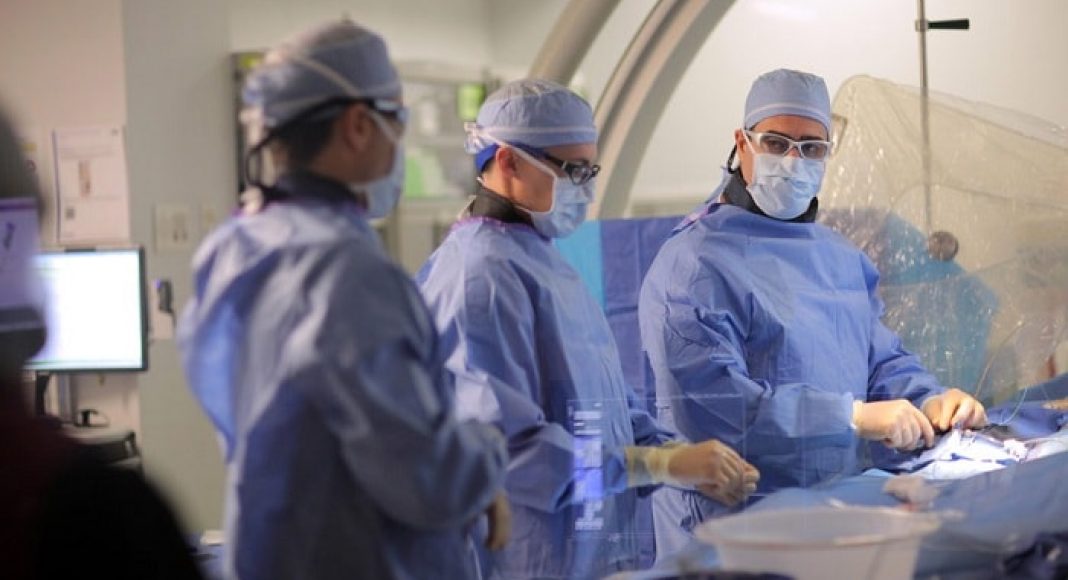To help address the complex needs of patients with stroke and other conditions affecting blood vessels in the brain and spinal cord, NYU Langone Health has launched the Center for Stroke and Neurovascular Diseases, a state-of-the-art, multidisciplinary program with locations in Manhattan and Brooklyn.
Led by directors Howard A. Riina, MD, professor of neurosurgery, neurology, and radiology and vice chair of the Department of Neurosurgery, and Koto Ishida, MD, assistant professor of neurology and director of NYU Langone’s stroke program, the Center for Stroke and Neurovascular Diseases brings together leading experts in vascular neurology, neurosurgery, neurocritical care, neuro-interventional radiology, neuroradiology, and neurorehabilitation medicine who specialize in diagnosing and treating people with disorders affecting vessels of the brain and spinal cord. They also recommend preventive strategies for those who may be at high risk for these conditions.
The program builds on NYU Langone’s international reputation for excellence in the neurosciences. NYU Langone is consistently among the top 10 hospitals in the country for both neurology and neurosurgery, according to U.S. News & World Report’s “Best Hospitals” rankings.
Among the specific conditions treated at the new center include stroke or transient ischemic attack (TIA), brain aneurysms, arteriovenous malformations, dural and arteriovenous fistulas, vascular tumors, cavernous malformations, carotid stenosis, moyamoya disease, and carotid or vertebral dissection.
The center will also serve as a hub for collaborative research, including ongoing projects that focus on development of new treatments and surgical devices, and creating new diagnostic, imaging, and rehabilitation tools.
Using the Latest Science and Technology to Treat Complex Neurovascular Conditions
The Center for Stroke and Neurovascular Diseases incorporates cutting-edge technology such as minimally invasive microneurosurgery techniques, endovascular neurosurgery through the blood vessels, and Gamma Knife® radiosurgery for people with blood vessel neurological conditions. Two customized hybrid neurosurgical suites combine complex three-dimensional and four-dimensional surgical planning tools and virtual and augmented reality with intraoperative angiography, endovascular intervention, and surgical image guidance to provide the most advanced patient care available.
“Neurovascular conditions would be extraordinarily difficult to treat without the concentration of advanced neuroimaging, specialized treatment techniques, and the expertise of our colleagues that we can leverage on a daily basis,” says Dr. Riina. “Our center can treat the most unique and complex cases, providing options for successful surgical treatment that are simply unavailable elsewhere.”
Top-Rated Stroke Care in Manhattan and Brooklyn
NYU Langone’s Comprehensive Stroke Center, with locations at Tisch Hospital in Manhattan and NYU Langone Hospital—Brooklyn, provides advanced stroke care 24 hours a day, 7 days a week and offers rapid diagnosis, effective treatment, and rehabilitative care for people who have experienced a stroke. The cross-campus stroke center is certified as a Comprehensive Stroke Center by The Joint Commission and the New York State Department of Health, acknowledging the multidisciplinary team of neurologists, neurosurgeons, neuroradiologists, specially trained nurses, and rehabilitation medicine specialists are able to provide the most advanced stroke care available.
Vascular neurologists at NYU Langone’s emergency rooms are the first team members to see a patient who may be having a stroke. If a stroke is confirmed, they create an individualized treatment plan that can include intravenous (IV) drugs like tissue plasminogen activator (tPA) to dissolve a clot, or a thombectomy procedure to mechanically remove the clot with a tiny catheter. Some people with more serious injury or illness may be admitted to neurocritical care units, where their care is overseen by specially trained neuro-intensivists. NYU Langone rates among the city’s fastest in time to tPA and number of thrombectomies performed, successfully restoring blood flow to the brain in more patients compared to other academic medical centers, according to recent outcomes data.
“Both the clinical symptoms and underlying causes of stroke are very diverse and there is never a one-size-fits-all treatment approach,” says Dr. Ishida. “Most importantly, people need to know the signs of stroke and get the patient to the emergency room if one is suspected. There is a term we use in treating stroke: ‘time is brain.’ Treatment needs to be administered as quickly as possible to ensure the best chances of recovery.”
If inpatient or outpatient rehabilitation is needed following a stroke or other neurovascular disorder, clinicians from NYU Langone’s Rusk Rehabilitation, including neurorehabilitation physicians, physical therapists, occupational therapists, speech–language pathologists, and psychologists can aid in recovery. Patients also have access to clinical trials at Rusk Rehabilitation’s Motor Recovery Research Lab, which has several ongoing research projects aimed at developing better treatment options for spasticity and motor recovery in people who have had a stroke.
The stroke program also emphasizes education, and participates in community efforts to raise awareness in the New York City metro area about knowing the risks and signs of stroke, and the importance of prevention.


















